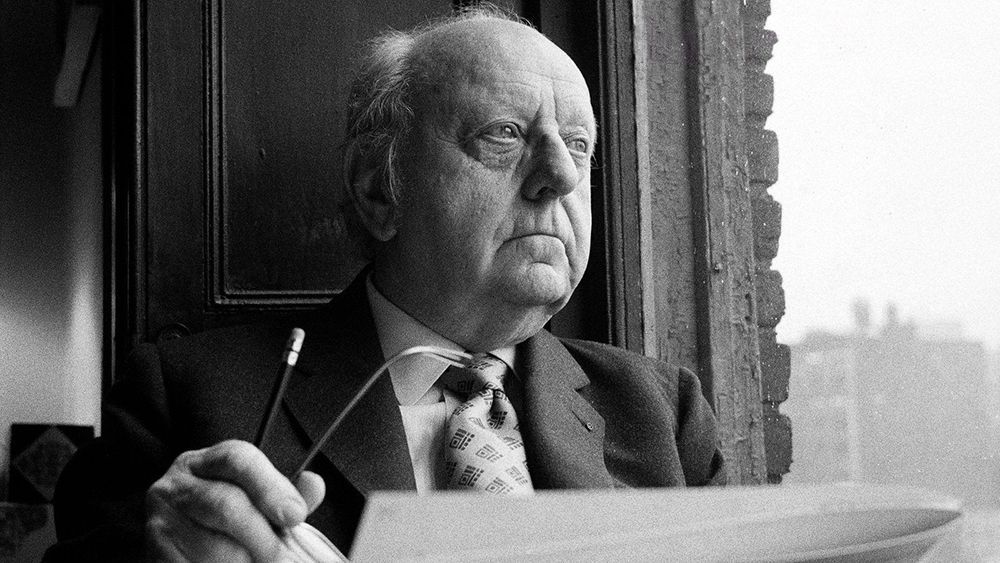Virgil Thomson

Originally published in the International Dictionary of Films and Filmmakers, 4th Edition 2000
Text reproduced by kind permission of the author, Philip Kemp
Virgil Thomson’s reputation as a composer of film music is out of all proportion to his output. He wrote scores for only eight movies, six of them documentaries. Yet these scores - and two of them in particular - exerted a lasting influence on the development of 20th-century American music, not only for films but in the concert hall as well.
Born in Missouri, Thomson studied during the 1920s with Nadia Boulanger in Paris, revelling in the musical and artistic ferment of the era. Invited in 1936 to provide a score for Pare Lorentz's documentary, THE PLOW THAT BROKE THE PLAINS, he responded with music that treated indigenous American folk themes with a wit, litheness and affectionate irony learnt from Satie and the composers of
Les Six, creating an engaging blend of naivety and sophistication.
Lorentz's film, commissioned by the US Department of Agriculture, dealt with the Dustbowl disaster of the American Midwest, when thousands were driven off the land by economic and ecological breakdown. Working closely with Lorentz - and virtually for nothing, since the director had long since overspent his minuscule budget - Thomson wove further strands of association around the film's evocative images. For the arrival of cattle on the high plains, banjo and guitar pick out the plangent melancholy of cowboy songs like “Streets of Laredo,” while scenes of rampant financial speculation are treated to a raunchy, sardonic blues, vibrant with saxophones, that recalls the Weill of DREIGROSCHENOPER.
Thomson's score for THE PLOW reached wider audiences through the orchestral suite he drew from it, and so did the music for his second collaboration with Lorentz. Backed, like its predecessor, by Roosevelt's New Deal Administration, THE RIVER sketched a brooding, elegiac account of the Mississippi valley, culminating in a celebration of Roosevelt's pet scheme, the Tennessee Valley Authority. Once again Thomson's score set off the images - and Lorentz's incantatory script - with a piquant mix of original material and indigenous melodies: hymn-tunes, spirituals and popular songs, including (for scenes of booming industrial expansion) an uproarious handling of “Hot Time in the Old Town Tonight.”
To Aaron Copland, Thomson's score for THE RIVER provided “a lesson in how to treat Americana.” Its influence can be heard in Copland's own ballet scores - Rodeo, Billy the Kid, Appalachian Spring - as well as in the work of associated composers such as Roy Harris and Walter Piston. But in the specific field of film music Thomson's two scores for Lorentz established an alternative mode to the lush Germanic romanticism then prevalent in Hollywood movies. Not only through Copland's own film scores (and via Copland, those of his followers such as Bernard Herrmann and Alex North) but for American film music in general Thomson set out options of concision and spareness, of a clean, sharply-etched idiom rather than an overall impressionistic haze.
“The movie,” Thomson once wrote, “is a true musical form, as truly a musical form as the opera, though without the opera's inseparable marriage of music to words.” Nowhere was his theory better demonstrated than in his score for Flaherty's LOUISIANA STORY. The film, financed by Standard Oil, showed the coming of oil prospectors to the swamp wilderness of the bayous, seen through the eyes of a native Cajun boy. Drawing this time on an anthology of Cajun folk song, Thomson clothed the haunting melodic lines in a rich variety of instrumental texture, combining them as before with original passages of his own. Though employing complex formal devices—a twelve-tone chorale, a passacaglia, a chromatic double fugue - the music never seems academic, nor loses the simplicity and rhythmic freedom appropriate to its basic material and to Flaherty's lyrical images.
Thomson's score for LOUISIANA STORY won him a Pulitzer Prize, the first Pulitzer award ever granted to a film score. Once again he adapted the music for concert use, deriving from it two separate orchestral suites and a ballet, The Bayou.
The only feature film Thomson scored was THE GODDESS, the rise to fame of a Monroesque Hollywood star directed by John Cromwell from a script by Paddy Chayefsky. Less distinctive than his documentary work, the music suggests that Thomson felt hampered by composing for fiction film, with its limited scope for elongated lines and symphonic development. Even so, THE GODDESS allowed him to exercise his talent for spot-on pastiche. At various points in the film (which covers the years 1928–58) a radio is turned on and jazz emerges, each time perfectly in period in its style and instrumentation. Yet all of it is Thomson's original work - further evidence of his exact and appreciative ear for indigenous American music of every kind.



